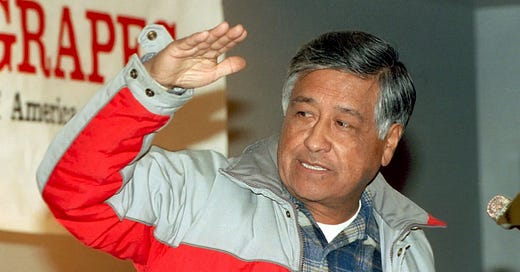On April 23, 1993, Cesar Chavez, a student of Gandhi, died in his sleep. He was 66 years old.

Chavez was a union organizer, co-founder of the United Farm Workers (UFW). Field hands in California suffered from exploitative working conditions, in part because they were exempted from labor protections on both the state and national levels. Having spent years working in the fields alongside his parents, he knew firsthand what the farm workers faced. Individually, they were often at the mercy of their employers, but united, they could collectively bargain for better working conditions.
In the Gandhian tradition, Chavez used public fasts to focus attention on his goals. The first of these began February 15, 1968, to dedicate the United Farm Workers to nonviolence; Robert F. Kennedy joined him to break the fast after twenty-four days. Another came in 1972, in opposition to a state law that restricted the use of boycotts and strikes by farm workers.
Like Gandhi, Chavez was also shaped by his religious upbringing. His actions resonated with the Catholic traditions of service and sacrifice. Dorothy Day (who I wrote about last June), was a supporter of Chavez and visited him on several occasions, even getting arresting on a UFW picket line in 1973. When she died in 1980, Chavez traveled to attend her funeral service.
Unfortunately, Chavez made some questionable decisions for the UFW starting in the late 1970s. Instead of remaining focused on growing the union, he began to steer them toward the political arena, investing in expensive statewide ballot measures and channeling union funds to candidates. Chavez also began a series of purges, expelling volunteers that he accused of disloyalty or even being Communist sympathizers. He also imported “The Game” from “a cultish drug treatment program,” Synanon. It subjected participants to a public airing of grievances to “clear the air,” but these profanity-laced tirades did nothing to build team spirit. Instead, UFW organizers were driven out or left the movement.
Chavez’s last and longest fast was the “Fast for Life” in 1988. With the goal of drawing attention to the harmful use of pesticides in the fields, which exposed workers to carcinogens and birth-defect causing chemicals, he went without food for 36 days. Five years later, Chavez fasted for more than a week to prepare himself for an Arizona trial which could have bankrupted the UFW. After two exhausting days of testimony, he died suddenly on April 23, 1993. His legacy of advocating for marginalized communities through nonviolent organizing continues to inspire; last month President Biden issued a proclamation commemmorating Cesar Chavez.
Today’s discussion question looks at an objection raised by employers resistant to unions demanding higher wages; those costs will be passed on to consumers through higher prices. With inflation impacting the American economy, is this a legitimate reason to keep worker pay low?


